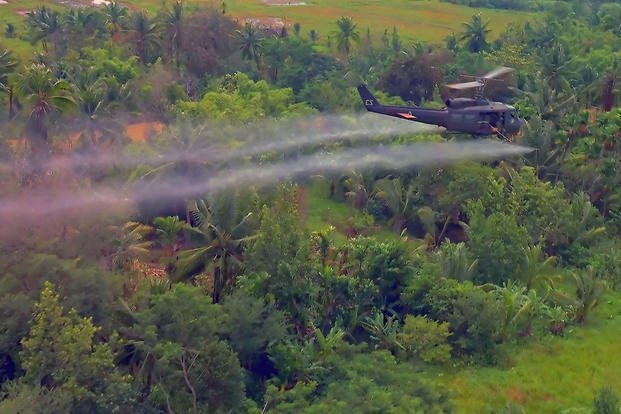A bill passed by the House on Thursday that would expand benefits for post-9/11 veterans sickened by burn pits and other battlefield pollutants also would affect more than a half-million veterans exposed to Agent Orange.
The $208 billion legislation, which passed the House in a 256-174 vote, faces an uncertain future in the Senate. But it would add hypertension and monoclonal gammopathy of undetermined significance, or MGUS, to the list of diseases linked to Agent Orange -- provisions that would make an estimated 490,000 Vietnam veterans with these illnesses eligible for disability compensation.
It also would update the locations where Vietnam-era veterans served that are covered, adding some areas where former service members said toxic herbicides were sprayed or stored.
Read Next: Ukraine War Sparks Call for Billions More in Pentagon Funding
Some of those locations weren't well documented, according to veterans, preventing them from being able to file expedited disability claims.
If the bill became law, the following locations and service dates would be added:
- Thailand at any U.S. or Royal Thai base between Jan. 9, 1962, and June 30, 1976
- Laos between Dec. 1, 1965, and Sept. 30, 1969
- Cambodia at Mimot or Krek, Kampong Cham province, between April 16, 1969, and April 30, 1969
- Guam or American Samoa or their territorial waters between Jan. 9, 1962, and July 31, 1980
- Johnston Atoll or any vessel that called on the atoll between Jan. 1, 1972, and Sept. 30, 1977.
The Department of Veterans Affairs has previously balked at adding hypertension to the list of Agent Orange presumptive illnesses, mainly out of concern for cost and the fact that risk factors other than herbicide exposure -- such as age, diet and tobacco use -- can contribute to its development.
Under the Trump administration, VA Secretary Robert Wilkie declined to add hypertension and several other illnesses to the list, saying he was waiting for the results of several studies to be published before making a decision.
Members of the House Veterans Affairs Committee included the illnesses in the Honoring our Promise to Address Comprehensive Toxics, or PACT, Act, however, citing a 2018 finding by the National Academies of Sciences, Engineering and Medicine that there was "sufficient evidence of an association" between hypertension and Agent Orange exposure.
"Vietnam veterans have waited decades for scientific support and now have that, but they are still waiting for the benefits they deserve due to VA's unwillingness to take decisive action. [The bill] seeks to remedy this," committee members wrote in a report accompanying the bill.
The legislation also seeks to rectify issues with veterans exposed to radiation and chemicals in other locations, making roughly 6,000 veterans who participated in decontamination and containment in Enewetak Atoll from 1977 to 1980 and 1,600 veterans who cleaned up after the Palomares, Spain, nuclear accident in 1966 eligible for health care and benefits if they have illnesses linked to radiation exposure.
The bill also would give veterans who spent at least 30 days at Camp Lejeune, North Carolina, between Aug. 1, 1953, and Dec. 31, 1987, the ability to file claims tied to that base's contaminated water system against the government in federal court.
Together with the burn pit and other exposure provisions, the bill could affect more than 3.5 million veterans -- the largest piece of veterans exposure legislation since passage of the Agent Orange Act of 1991.
The Senate has passed a $1 billion proposal to broaden post-9/11 veterans' access to VA health care, but it does not contain any of the provisions for veterans who served before Sept. 11, 2001.
House Veterans Affairs Committee Chairman Mark Takano, D-Calif., said Thursday he hopes to work with Sen. Jon Tester, the Montana Democrat who chairs the Senate Veterans Affairs Committee, to pass comprehensive legislation similar to the House bill.
"This fight is not over, but I will not rest until our veterans have a guarantee in statute that their government will take care of them when they come home," Takano said in a news release.
-- Patricia Kime can be reached at Patricia.Kime@Monster.com. Follow her on Twitter @patriciakime












